Welcome to the Health Policy and Systems Division

As a team, we work with concern for each other and, through our educational, research and social engagement collaborations, we strive to generate southern scholarship for health system development and the promotion of social justice.
We are an intentionally interdisciplinary group who draw on a range of social science and public health perspectives, and work closely with various organisations engaged in health policy and systems work.
Through our work we seek to deepen understanding of the dynamics of health policy change and health system development, with particular concern for issues of governance and stewardship, the dynamics of policy implementation, and the role of the health system in enabling health equity and public value. We have a particular, but not exclusive, focus on South Africa and Africa. Read more on our web page about our:
- Postgraduate teaching and support
- Research
- Social responsiveness activities
- Team profile
The HPS division hosts and supervises students at PhD, Masters and Diploma levels.
We convene the Master’s in Public Health (MPH), Health Systems Track – and the MPH courses: Introduction to Health Systems (HIS), Health Policy and Planning (HPP) and Health Systems Research and Evaluation (HSRE). We also convene the Post Graduate Diploma in Health Leadership, otherwise known as the Oliver Tambo Fellowship programme. The Diploma is the longest running health management training programme in South Africa and is a flagship programme in the Faculty of Health Sciences. We also welcome prospective PhD students addressing topics linked to our research interest and concerns, whilst being open to other ideas.
Finally, we welcome prospective PhD students addressing topics linked to our research interest and concerns, whilst being open to other ideas. Our current PhD students are listed in the 'Our Team' page.
MPH, specialising in Health Systems | Track Convenor: Assoc Prof Jill Olivier
The Health Systems Track is intended for those candidates who have an interest in seeking to change, managing within, or researching the health system. The focus is the health system as a whole - rather than particular health services, or condition specific programmes or health problems. Health system concerns address the complex range of factors that underpin service delivery (such as human resource development and management, financing and resource allocation, information systems, supply chain management and overarching models of care). Understanding how these factors interact and influence health system performance is an essential starting point for thinking about how to change and strengthen the system. Also important, is understanding the politics of policy change, and the factors influencing whether health system reforms and wider health interventions are developed and implemented in ways that support achievement of their goals.
Course: Introduction to Health Systems (PPH7093F): This first semester course aims to introduce the core elements of any health system, understanding health systems as complex systems comprised of components, actors and inter-relationship. It provides a platform of understanding relevant to health systems analysis, action and research.
Course: Health Systems Research and Evaluation (PPH7094S): This second semester course is an introduction to health systems research and evaluation approaches and methods. It introduces contemporary interdisciplinary approaches to applying systems thinking through research, and studying complex health systems.
Course: Health Policy and Planning (PPH7041S): This second semester course introduces participants to the field of policy analysis and to critical issues in health policy. Policy analysis focuses on understanding the political and social forces that influence why and how policies are (or, sometimes, are not) initiated, formulated, negotiated, communicated, implemented and evaluated, drawing on political science and public administration perspectives.

Post-graduation celebrations for the MPH health system track, UCT main campus
What our graduates do: Graduates of the MPH with a Health System specialization can currently be found as: managers and policy makers within Departments of Health; as researchers, implementors and advisors within bilateral agencies and NGOs; in academic and advocacy roles.
For more detailed information on the MPH and intake information, please visit the MPH web page.
Post Graduate Diploma in Health Leadership (Oliver Tambo Fellowship Programme) | Programme Convenor: Assoc Prof Maylene Shung-King
The PG Dip in Health Leadership is one of the longest existing health management and leadership courses in the country and is the central element of the Oliver Tambo Fellowship (OTF) programme. The programme has a large network of alumni of over 300 graduates spread across the country, the majority of whom are in senior and middle management positions in the public health sector. More recently the Diploma included graduates from relevant non-governmental organisations, private non-profit and for-profit health care organisations, as well as international students. Our target audiences are participants from all sectors who seek to create public value.
To maintain the relevance and quality of our teaching, the Diploma is constantly reviewed to draw on new teaching and learning modalities that support the development of health leadership and management capacity. Work-place based learning and support, drawing on workplace teams, is a central element of our curriculum. Training in teams or cohort of team members is also encouraged.
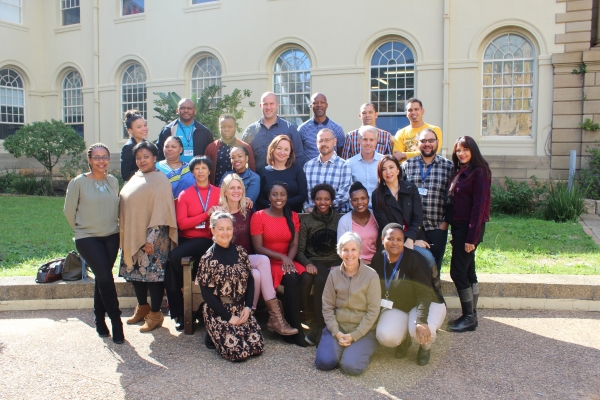
The PG Dip Health Leadership cohort of 2019, UCT Faculty of Health Sciences
What our graduates do: Graduates of the PGDip in Health Leadership tend to take their learnings back into their workplaces. Our current graduates include regional and district health managers, hospital managers, clinical leaders, policy makers and advisors. The Diploma thus contributes significantly to the strengthening of health management and leadership in the South African Health System and beyond.
For more detailed information on the Diploma and intake information, please visit the Postgraduate Diploma in Health Leadership web page.
PhD Programme
PhD candidates are selected in the basis of the Division’s commitment to developing opportunities for emerging academics and researchers in the field of health policy and systems research. The topic and scope of the PhD will be further refined with candidates as part of the development of the PhD proposal. We welcome PhD applicants addressing our current areas of research interests, highlighted here.
The PhD experience is usually individualised – for example, some students work full time while doing a PhD part time, and others are full-time students. We also have students conducting PhDs relating to their work (e.g. within a Ministry of Health), and others are pursuing an academic career trajectory in the field of Health Policy and Systems Research. Whatever the configuration, our PhDs become part of the ‘Health Policy and Systems Family’, and are involved in the array of research, teaching, and mentorship offered through the Division. Please see the page on ‘Our Team’ to meet our current PhD candidates.
What our graduates do: A PhD with a health systems specialization provides opportunities at the highest levels – whether within the health system at senior leadership and advisory levels, or within an academic career trajectory.
For more detailed information on a PHD with a health systems specialization and intake information, please visit the PHD web page
As Health Policy and Systems Researchers, our work focuses on health systems as a whole - rather than particular health services, condition-specific programmes or health problems. Health system concerns address the complex range of factors that underpin service delivery. These include various system functions (e.g. leadership and governance, human resource development and management, financing and resource allocation, overarching models of care), as well health system software (e.g. values, norms, planning processes) and hardware (e.g. organisational structures, funding flows, personnel levels). Understanding how these factors interact and influence health system performance is an essential starting point for thinking about how to change and strengthen the system.
We also examine health policy processes and consider how to strengthen them. Health policies play an important role in complex health systems - shaping how health systems are experienced by those who use them. The complex political and social processes through which health issues are placed on the policy agenda, developed and implemented determine the extent to which policy goals are ultimately achieved.
Through our work we seek not only to understand health systems, but also to contribute actively and consciously to strengthening them. We understand health policy and system research - and researchers - to be important elements of the health system and seek to undertake research that fills real-world gaps in knowledge and is responsive to the concerns of policymakers, implementers and activists.
In our research, we a strive to be methodologically creative: drawing from a range of disciplines; conducting inter-disciplinary and trans-disciplinary research; using embedded research approaches to co-produce knowledge while simultaneously learning about and strengthening the health system.
Our research work can be categorised into the following overlapping broad themes:
1. Equitable health systems
All of our work is founded on a concern for social justice, and considers the role of health systems in promoting health and health care equity.
More specifically, in our research on non-communicable diseases and the social determinants of health, we explore how power, politics and vested interests shape who bears the burden of ill health, recognising the inequities inherent in this, and seeking to support health policy action and health system strengthening to address these inequities. In addition, we consider the role of the health system in implementing activities to support particular socially marginalised or vulnerable population groups. Also in this theme, is work that explores the relationship between citizens and the state, including how it is experienced by health system users. This includes work investigating how trust in the state influences the ability of the system to be responsive to the needs of those who use it, particularly marginalised and vulnerable populations.
2. Health system responsiveness
Health systems operate within constantly changing contexts and must meet a diverse range of health needs for the populations they serve. The capacity of health systems to continually innovate and evolve to meet population needs as they change over time, is referred to as health system responsiveness. To be responsive, health system actors, including decision-makers and front-line providers, need to have the freedom and capacity to be creative and flexible.
In addition, health systems ought to be sensitive to the preferences of those who use them, and the acceptability of health service delivery (referring to the extent to which the organisation and delivery of healthcare aligns with cultural and social preferences of users) is a key determinant of population health. Finally, this body of work includes the identification of bottom-up processes of accountability and innovation within health systems, and the factors that enable or constrain them.
3. Health system resilience
Since the Ebola epidemic in West Africa in 2014 attention has been paid globally to health systems resilience for the most part, defined as the ability of a health system to withstand shocks such as epidemics, large scale budget cuts or natural disasters.
In our research we have also specifically considered the chronic stressors that health systems must adapt to routinely from health worker absenteeism, to resource shortfalls, to organisational change and multiple top-down policy imperatives. We have developed the notion of everyday resilience to consider how health systems respond to such chronic stress, considering experience at facility and local area level, nested within broader sub-national or national structures. We judge that this everyday resilience is also important for resilience to acute shocks, like COVID-19.
4. Leadership and governance
Leadership and governance are important influences over health system functioning and performance. In this area of work we investigate the influence of leadership and management cultures and processes on health system functioning, including service delivery and management of human resources. Importantly, our educational and research activities interact in relation to leadership development. In addition, our work strives to support leaders and management within the South African and Western Cape health systems by identifying potential interventions to be implemented by health managers or civil society organisations to strengthen community engagement and promote accountability.
5. Health system actors and influences
We take a broad view of ‘health systems’ and recognise that systems are comprised of and driven by a diverse array of important actors. The analysis of the interactions between these actors is an important element of understanding and strengthening health systems. This area of work includes, for example, work on ‘street level bureaucrats’ within the public health system, as well as on Public Private Partnerships and other forms of engagement between state and non-state actors, and the significant role faith-based providers have played (and in many health systems continue to play) in delivering health services alongside the state and for-profit providers).
We also recognise that many community actors play an informal but significant role in caring for children, the elderly and those who are sick, in creating and preserving healthy living environments, and in communicating health information to others.
6. Health policy and politics
The socio-political processes that determine which health and health system challenges are addressed by health policy interventions is an area of work that is under-studied and not well understood, particularly in LMICs. This body of work considers the influence of power, politics, actors, interests and ideas in shaping how health problems become policy issues, and how policies are framed, communicated and ultimately implemented. The work overlaps with our research around health system actors and influencers. In addition, in this area values and social justice goals play a critical role, and the work seeks specifically to analyse the social values, political factors and ideas influencing the development and implementation of health policy change.
7. HPSR research agenda, theories and methods
As HPSR is a relatively new field, the bounds of the field of study, as well as the most appropriate methodologies for exploring health systems, are constantly being refined and reiterated. As a Division, we seek to actively contribute to building and strengthening the field of HPSR by extending and strengthening inter-disciplinary perspectives and methodological approaches for HPSR. Accordingly, in our research we seek to influence the research agenda within HPSR, as well as identify and eliminate theoretical or conceptual gaps, and develop and refine new methodologies.
This body of work includes two research Readers (anthologies of papers, available here, a range of evidence synthesis approaches to bring together existing knowledge and facilitate engagement with it, and enable better use of HPSR in decision-making.
In addition, much of our field-building work uses theory on complex adaptive systems and systems-thinking. Because health systems are complex, context-dependent social systems, interventions regularly have unintended and unanticipated consequences, particularly over time. This area of work also, then, includes research that uses novel approaches to evaluate the effect of health system strengthening interventions over time and in different contexts, such as prospective tracking work and work using historical methods.
As a division, our orientation to social responsiveness is that it is a ‘way of being’, purposive and deliberate, an overall orientation of the HPS Division and infused into all our work. At the core of our work is a commitment to supporting health system development for public value – including through reciprocal relationships with health system actors and civil society stakeholders.
The following initiatives/projects reflect some of the various dimensions of SR as espoused by the University:
1. Journal Club – see article here
The Western Cape (WC) HPSR Journal Club (JC) is an embedded HPSR hub that was established in 2012. The bi-monthly sessions are attended by provincial and local government health managers, as well as academics involved in education and research and researchers from other organizations. It is a space for collective sensemaking and knowledge mobilisation that draws on 'the tacit knowledge of experienced practitioners into the task of better understanding health policy and health systems, and how to strengthen policy implementation and system performance'.
2. Child Health Gauge 2019 – see report here
The South African Child Gauge is an annual publication of the Children’s Institute, University of Cape Town that tracks progress for South Africa’s children. It aims to make the latest research accessible to decision-makers, practitioners and civil society, in order to inform evidence- based policies and programmes for children and guide advocacy on behalf of, and with, children. In the 2019 edition special attention was paid to the health system challenges and opportunities for child health improvement.
3. Cape Town Together CAN – see article here
Cape Town Together, a network of self-organising neighbourhood-level groups known as Community Action Networks (CANs), emerged in response to the COVID-19 pandemic. From sharing information and resources, to setting up community kitchens, the network became an important part of the overall societal COVID-19 response.
4. NHI Library - can be found here
This online repository of NHI-related submissions, opinion pieces and policy documents is a collaboration between our division, CHEASI and the Health Justice Initiative (HJI).
5. Sex work and LGBTIQ+ rights and health research and advocacy
This area of advocacy and research work highlights the experiences of queer persons and sex workers in navigating health systems and services. This work is in collaboration with organisations such as Mothers for the Future, Sex Workers Education and Advocacy TaskForce (SWEAT), the Sexual and Reproductive Justice Coalition (SRJC) and the Triangle Project. This work connects to efforts to mobilise towards the decriminalisation of sex work to advance the rights and health of sex workers, with efforts to ensuring realisation of constitutional and human rights womxn, LGBTIQ+ persons, their partners, and families. Click here for more information.
6. HPSR field building
Since our establishment, the Division has sought to support HPSR field-building through networking and engagement both within South Africa and more widely, and through the production of relevant resources. These activities have focused on creating spaces for scholarly endeavour and engagement (CHESAI), networking within South Africa (through PHASA, the Public Health Association of South Africa, HPSR Special Interest Group), developing and sharing HPS teaching materials within Africa (CHEPSAA), mentoring Southern-based PhD students conducting HPA work (HPA Fellowship), encouraging conversations and action towards decolonising health systems and supporting Health Systems Global, the global membership body for this field. Further information on these networks is found below.
- CHESAI (Collaboration for Health Systems Analysis and Innovation, click here for more information)
- CHEPSAA (Consortium for Health Policy and Systems Analysis in Africa, click here for more) information).
- HPA (Health Policy Analysis) Fellowship programme (click here for more information)
- Health Systems Global, click here for more information
We use a variety of approaches to share our work, adapted to read different target audiences. Full publication lists of staff members are also available through their google scholar pages (see ‘Our Team’ profiles).
Here we provide examples of other types of outputs from our work.
OpEds
- Cape Town Together: Organizing in a city of islands
- Sparks, flames and blazes: Epidemiological and social firefighting for Covid-19
- 10 Questions about Sizani Universal Healthcare — the DA’s answer to NHI
- Co-production of research with sex workers as a political act
- Global Health is still the “Master’s House”: how brave are we to decolonise and dismantle it?
Advocacy outputs
- Dala Kitchen - more than a Cook Book, a resource for bottom-up organising drawing from the experiences of Cape Town Together and the Community Action Networks: accessible here
- Child Health advocacy briefs - key issues in relation Child health and COVID: accessible here
Videos and Webinars
- Red Zone Paramedics: a short documentary about the work of the Emergency Medical Services in Cape Town, by Leanne Brady: accessible here
- Cape Town Together: a short documentary on a community-led network initially developed in response to COVID-19, by Leanne Brady: accessible here
- Sex work and COVID: a short documentary calling for the inclusion of sex workers and LGBTI+ people in the state’s emergency response to COVID-19, supported by Lance Louskieter through TEKANO: accessible here
- Decolonizing health systems – a series of conversations
Selected, recent Journal articles
- Abimbola, S., Asthana, S., Montenegro, C., Guinto, R. R., Jumbam, D. T., Louskieter, L., & Pai, M. (2021). Addressing power asymmetries in global health: Imperatives in the wake of the COVID-19 pandemic. PLoS medicine, 18(4), e1003604.
- Engelbrecht B., Gilson L., Barker P., Vallabhjee K., Kantor G, Budden M., Parbhoo A., Lehman U. (2021). Prioritizing people and rapid learning in times of crisis: A virtual learning initiative to support health workers during the COVIDâ19 pandemic. International Journal Health Planning and Management 36(S1):168–173.
- Orgill M, Marchal B, Shung-King M, Sikuza L, Gilson L. (2021). Bottom-up innovation for health management capacity development: a qualitative case study in a South African health district. BMC Public Health 21, 587.
- Sutherns, T. and Olivier, J. (2021, advanced access). Mapping the Multiple Health System Responsiveness Mechanisms in One Local Health System: A Scoping Review of the Western Cape Provincial Health System of South Africa. International Journal of Health Policy and Management.
- Schneider H., Olivier J, Orgill M., Brady L., Whyle E., Zulu J., Sebastian M.S., George A. (2021, advanced access). The Chaminuka Collective. The multiple lenses on the community health system: Implications for policy, practice and research. International Journal of Health Policy and Management.
- Whyle E.B. & Olivier J. (2021). Towards an Explanation of the Social Value of Health Systems: An Interpretive Synthesis. International Journal of Health Policy and Management 10(7), 414–42.
Core Academic Staff
Associate Professor Jill Olivier

Email: Jill.Olivier@uct.ac.za Twitter: @Jill_Olivier
Jill Olivier is a South African and UCT alumni, graduating with a PHD from the Humanities Faculty – after which she worked in varied sectors, including as a consultant at the World Bank in Washington DC, before returning to SA and UCT. She splits her time between teaching and research. | |
Associate Professor Maylene Shung King

Email: Maylene.Shungking@uct.ac.za Twitter: @MayleneSK
Maylene Shung-King is a trained medical doctor and has a DPhil (Oxford) in Social Policy. She previously worked as Deputy- and Acting Director of the Children’s Institute at the University of Cape Town for 10 years. Her passion for child health remains and she currently is involved in a multi-country research network focusing on determinants of NCDs in adolescents, in Africa and the Caribbean. She convenes a post-graduate Diploma in Health Leadership, thus contributing to health systems strengthening through leadership capacity development. | |
Dr Tumelo Assegaai 
Email: Tumelo.Assegaai@uct.ac.za Twitter: @assegaai_tumelo
Tumelo recently joined the School of Public Health, Health Policy and Systems Division as a lecturer. She has worked in both the public and private sector and obtained her PhD from the University of the Western Cape. Her research interests are health systems research and community health workers. | |
Eleanor Whyle 
Email: Eleanor.Whyle@uct.ac.za Twitter: @eleanorwhyle
Eleanor Whyle is a health policy and systems researcher with a particular interest in systems-thinking, the social, political and historical dynamics of health policy processes, and the influence of ideational factors on health systems and policy. Eleanor has a Master’s in Philosophy from the University of the Witwatersrand, and an MPH and PhD from UCT. Her PhD research used a longitudinal policy analysis of the South African National Health Insurance policy to explore the influence of changing social values on health systems and policy processes. |
Emeritus Professor
Professor Lucy Gilson

Email: Lucy.Gilson@uct.ac.za Twitter: @Lucy_Gilson
Lucy’s research broadly focusses on how to strengthen health systems to offer better public value, with particular concern for health equity. She has a track record of research around: health policy implementation; decentralisation, district health systems and primary health care; user fees and financing issues; governance, leadership and management. As she has a particular interest in understanding health system actors’ decision-making, her work also considers how trust and power relations shape health system dynamics and complexity – recognising these relations as critical elements of health system software, and important in health system resilience. Lucy’s teaching focusses on health policy, health leadership, health systems and health policy and systems research. She is also involved in a wider range of capacity strengthening activities within the field of Health Policy and Systems Research. |
Honorary Professors
Professor Irene Agyepong
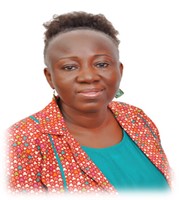
Twitter: @IreneAgyepong
Irene Agyepong is a public health physician and foundation fellow of the Ghana College of Physicians and Surgeons, Faculty of Public Health with expertise in health policy and systems research and practice. She has an MBChB from the University of Ghana Medical School; a Masters in Community Health from the University of Liverpool School of Tropical Medicine and a Doctor of Public Health from the Public Health Leadership program of the University of North Carolina at Chapel Hill School of Public Health. She led The Lancet commission on the future of healthcare in sub-Saharan Africa. |
Professor Uta Lehmann
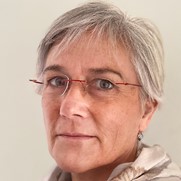
Twitter: @utalehmann
Uta Lehmann is a social scientist by training and has worked in public health and health personnel education for 30 years. As professor in the School of Public Health at UWC her interests and expertise lie in health policy and systems research, human resource development, and qualitative research. Her research projects have included a focus on understanding how relationships, power and politics impact on how health systems function, and exploring ways to support the voice and capacity of frontline providers and community health workers. She has led capacity strengthening initiatives for human resources development with sister institutions in other African countries and with international partners. She works extensively with the WHO and is the co-ordinator of the WHO Collaborating Centre for research and training in human resources for health. For the past twelve years she has worked closely with the Health Policy and Systems Division in the SOPHFM. |
Professor Helen Schneider
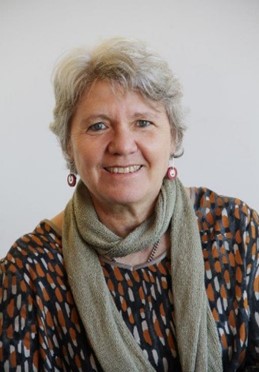
Twitter: @schneider_helen
Helen is a health policy and systems researcher based at the School of Public Health (SOPH), University of the Western Cape. She holds a research chair in Health Systems Governance (DSI/NRF SARChI) at UWC and is also Director of the SAMRC Health Services to Systems Extramural Research Unit. Her current research interests include district health systems, community health systems, bottom-up health system strengthening and intersectoral collaboration. She convenes the PhD programme in the UWC SOPH, which has led to many conversations on context-relevant discourse and models of doctoral education in public health. |
Adjunct Honorary Professors
Dr Beth Engelbrecht
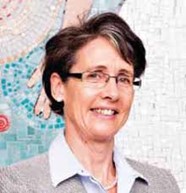
Twitter: @BethSnr
Dr Beth Engelbrecht is the Emeritus HOD of the Western Cape Health Department, an Honorary Associate Professor of UCT School of Public Health, and Faculty member for the Institute of Health Improvement (IHI), an international NGO. She is a qualified medical doctor with postgraduate qualifications in Family and Community Medicine. She has been in Public Service as a senior manager for 30 years across two Provinces. She concluded her career in the Western Cape as the first female Head of Health (2015 – 2020). In 2020 she was awarded the best HOD in the country. She has a keen interest in health systems, leadership and learning organizations, governance, and stewardship. She has authored several articles and chapters. |
Dr Krish Vallabhjee 
Twitter: @kvallabhjee LinkedIn: krish-vallabhjee
Dr Krish Vallabhjee has 41 years of cumulative experience in the public health sector in South Africa including 11 years in clinical services in the public sector and 26 years as a senior manager in the Health Department of the Western Cape. Senior Executive responsibilities included Director: Policy and Planning (6 years) and Chief Director for Regional Hospitals, Psychiatric Hospitals, TB Hospitals, Emergency Medical Services and Forensic Pathology Services in the province (8 years) . Dr Vallabhjee retired after 11 years as Chief Director: Strategy and Health Support which included responsibility for Policy and Planning, Information Management, Health Impact Assessment (Public Health), Professional Support Services (which includes private hospital licensing, medico - legal litigation, laboratory services and radiographic services) and Pharmacy Services. He was also Joint Staff (Hon Lecturer) at UCT School of Public Health and is currently appointed Adjunct Honorary Professor in the Health Systems and Policy Division at UCT. Qualified as a medical doctor at Royal College of Surgeons in Dublin, Ireland and as a Public Health Specialist in 1996 (FFCH) – Natal University, Kwa-Zulu Natal. Other qualifications include a Diploma in Occupational Health (Wits), Diploma in Health Financing and Management, Senior executive program convened jointly by Harvard Business School / Wits University and an Executive MBA at the Graduate School of Business at University of Cape Town. Currently appointed as a technical advisor to the Clinton Health Access Initiative (CHAI - SA). |
Honorary Senior Lecturer
Dr Melvin Moodley

Twitter: @MMinCT
Dr Melvin Moodley is director of strategy in the Western Cape Department of Health. He is strong healthcare services professional graduated from UCT. He is an experienced Chief Executive Officer with a demonstrated history of working in the government administration industry. He is skilled in areas of Healthcare Consulting, Quality Improvement, Strategic Planning, Hospitals, and Lean Management. |
Honorary Lecturer
Dr Katie Murie 
Katie Murie worked as a Family Physician at Guguletu CHC and Du Noon CHC prior to starting as a Clinical Manager for Southern Western Substructure in 2017. Her professional interests include system improvements and leadership development in our public health system, and my personal interests include cooking and reading. |
Honorary Research Associate
Dr Brigid Cakouros (Postdoctoral Fellow)

Email: bcakouros@berkeley.edu Twitter: @bcakouros
Brigid is a visiting Global Health Equity Scholar (GHES) postdoctoral fellow from the University of California, Berkeley. Her current work focuses on health system response to the COVID lockdowns, specifically on how health system organization can be associated with sustainable access to care at Primary Health Care (PHC) services. Previous work experiences range from the analysis of vaccine cold chain logistics to qualitative research design consultation. She is currently a lecturer in the online MPH program at UC Berkeley and is teaching the Introduction to Global Health course. |
PhD Graduants
Marsha Orgill (Graduated 2025)

E-mail: marshamix@gmail.com Twitter: @MarshaOrgill
Marsha Orgill completed a PhD in the Health Policy and Systems Division in the School of Public Health. Her PhD research considered management capacity building in the South African District Health System (DHS) and bottom-up innovation. Marsha Orgill has eleven years of experience working in academia, including post-graduate teaching and research in the health policy and systems field. She has a multi-disciplinary background in Public Policy and Economics. Her research areas include policy analysis with a focus on health management and leadership, the politics of policy formulation and bottom-up policy implementation in health systems. |
Thulani Masilela (Graduated 2023)

Email: thulani.masilela@dpme.gov.za
Thulani Masilela is an Outcome Facilitator in the Department of Performance Monitoring and Evaluation (DPME) in the Presidency, responsible for monitoring and evaluation the progress of the health sector towards the goals of the National Development Plan (NDP) 2030 through the 5-year Medium-Term Strategic Frameworks (MTSF). This role also entails provision of appropriate support for effective and timely corrective action to improve delivery performance. By profession, Thulani is a qualified and registered Clinical Psychologist, with vast experience in District Health Systems development. His PhD is considering the use of evidence in policy development in South Africa.
Bhavna Patel (Graduated 2022)

Email: Bhavna.Patel@westerncape.gov.za
Dr Bhavna Patel is currently the Chief Executive Officer at Groote Schuur Hospital in Cape Town, a 975 bedded, 3764 staffed hospital. She qualified as a medical doctor at the University of Cape Town and was in private practice for 8 years before completing her specialist degree in Public Health. She also holds a BSc degree, a Fellowship in Family Medicine and a Masters in Bioethics and Health Law. She has been working in a management capacity at Groote Schuur Hospital since 2001, starting as a registrar, then as the Manager Medical Services, then as the Senior Manager Medical services and now as the CEO, since 2013. Her PhD focused on leadership development and continuous improvement processes.
Dickson Okello (Graduated 2021)

Email: dickson.drookello@gmail.com
Twitter: @dickydroo
Dickson R. O. Okello holds a doctorate and a Master’s degree in Public Health, focusing on health policy and systems, from the University of Cape Town’s Health Policy and Systems Division. He has a Bachelor of Veterinary Medicine from the University of Nairobi. His master’s dissertation considered the influence of workplace trust on the motivation of healthcare workers. His doctoral research, The Leadership Trinity, examined the interplay between healthcare organisational context, collective leadership, and leadership effectiveness using a multiple case study design. His research interests include leadership and management practices and development, health policy analysis, and health systems research in Low- and Middle-Income Countries (LMICs).
PhD Candidates
Leanne Brady

Email: leanne.brady@uct.ac.za Twitter: @BradyLeanne
Leanne Brady is a health systems activist. She is currently working as an embedded researcher in the Western Cape Department of Health Emergency Medical Services (EMS) and is a PhD candidate in the division. Her PhD is considering the role of EMS at the interface between communities and health systems, and in catalysing collective action and system resilience, in Cape Town. | ||||||||
Joseph Nii Otoe Dodoo
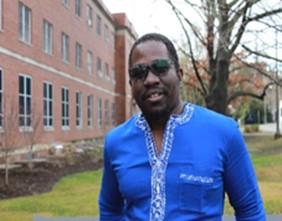
Email: profdodoo@gmail.com Twitter: @profdodoo
Joseph Dodoo holds a Master’s in Public Health from the University of Ghana and is a Ph.D. candidate at the University of Cape Town, South Africa. I am a Health Policy Analyst at the Ministry of Health, Ghana, and a Fellow at the Duke Global Health Institute, Centre for Policy Impact in Global Health. I have over 10 years of professional experience in health policy development and HPSR related work in both local and international spaces. My PhD is examining the role of central-level policy actors in sustaining policy implementation over time, in Ghana. | ||||||||
Rashid Hamisi 
Email: hmsras001@myuct.ac.za / hamzruh@gmail.com Twitter: @Hamisi_Rashid83 LinkedIn: https://l1nk.dev/6lIhX
Rashid is a PhD Candidate in the Health Policy and Systems Division. His PhD research explores the nature of relationships among implementing partners in health systems strengthening (HSS) initiatives, specifically, how the nature of these relationships affects the implementation process and outcomes of HSS initiatives in Zimbabwe. Rashid has thirteen years of experience – embedded in different levels of the health system, in the public and private sectors. He has a multi-disciplinary background in clinical practice and social science. His research interests include health systems in fragile and shock-prone settings, implementation evaluation of health systems strengthening initiatives with a particular focus on the interactions between implementation strategy and broader contextual factors, transitioning of external support/funding in public-private engagements, and health systems resilience. | ||||||||
Nothemba Kula

Email: nothembak@gmail.com Twitter: @nothembakula1
Nothemba Kula holds a Master's degree in Public Health from the University of London's School of Hygiene and Tropical Medicine and specialised in health services management. She is currently a PhD candidate exploring the use of the everyday health system resilience framework in examining South Africa’s health system response to the COVID-19 pandemic, using the Tuberculosis program as an entry point. | ||||||||
Lance Louskieter

Email: lsklan001@myuct.ac.za / l.louskieter@atlanticfellows.org Twitter: @lancelouskieter
Lance Louskieter (pronouns: they, them, their) is a health policy and systems scholar with a particular interest in queer & decolonial theory/practice and its relevance to advancing socially just and equitable health systems. Lance is a PhD candidate and senior Atlantic Fellow for Health Equity in South Africa (Tekano). Their PhD explores health systems responsiveness to queer users in primary health care settings in South Africa. | ||||||||
Tsepo Motsohi

Email: tmotsohi@sun.ac.za / tsepomotsohi@gmail.com
Tsepo is family physician working as a postgraduate programme coordinator at Stellenbosch University Division of Family medicine and Primary Care. He is interested in primary care systems and mental health, and his PhD draws on a health systems/systems thinking lens to explore the following question: How can the sorting of unscheduled primary care users be re-imagined and transformed using a comprehensive health systems approach within a Community Orientated Primary Care and co-design context? | ||||||||
Aaron Mulaki

Twitter: @AaronMulaki
Aaron is a PhD candidate with the Health Policy & Systems Division. His research interests focus on intersection of politics and power on health sector decentralization. Aaron is an Alliance for Health Policy and Systems Research, Health Policy Analysis Fellow (HPA 2017 Cohort). He is a regular reviewer for the Health Policy and Planning, and The International Journal of Health Planning and Management. Aaron is also a member of the Global Health Policy Research Forum, a collective of researchers that draw on social science theory to study global health and policy making. His PhD is examining politics and power in health priority setting and resource allocation decision-making at county level, in Kenya. | ||||||||
Administrative Staff
|
